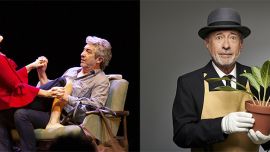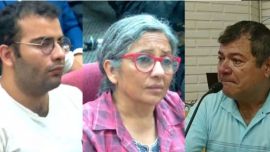Names of food, animals or outworn ideological tendencies form part of daily Argentine political vocabulary, at times a complex jargon for those not initiated.
Below is a run through the meaning and origin of some of the most common terms in the run-up to tomorrow’s presidential run-off between Peronist Economy Minister Sergio Massa and the far right libertarian Javier Milei.
Ñoquis and panqueques
On the 29th day of each month Argentines traditionally eat ñoquis (gnocchis), traditionally placing a banknote below the plate to attract abundance.
In politics the term refers to “public employees with salaries who do no work,” political scientist Andrés Malamud told AFP, those accused of showing up in the office only once a month around that day to pick up their pay-cheques.
“I’ll sweep away the ñoquis of La Cámpora,” said Sergio Massa in 2015, in allusion to the Kirchnerite youth organisation. That year Massa was a presidential candidate running against the administration led by Cristina Fernández de Kirchner .
But in 2019, Massa went back to forming part of an electoral front formed by Kirchnerism with the hashtag #MassaPanqueque immediately becoming a trending topic.
The panqueques (“pancakes”) are “leaders with disposable loyalties,” explains Malamud ironically. In other words, politicians who flip like pancakes.
After the first round of presidential voting on October 22, the Juntos por el Cambio (from the traditional right) candidate Patricia Bullrich pardoned Milei for having called her a “murderous Montonera” guerrilla, backing him for the run-off.
Milei also called for “starting from scratch” in his relationship with the leader.
“Javier flipping like a pancake ended up being the same or worse than the caste he rejects,” stated national deputy Amalia Granata at that time.
Political animals
After the agreement with Bullrich, the long-haired Milei circulated in the social networks a caricature of a lion hugging a duck. He identifies himself as the lion while pato (“duck”) is short for Patricia.
Sometimes a cat was also included. No Argentine needed any explanation that it represented ex-president Mauricio Macri.
Linking Macri to a cat rose as an insult in the social networks a decade ago. In lunfardo (“slang”) a gato (“cat”) is a thief or a stool pigeon seeking favour with prison authorities.
In time Macri adopted the tag, saying last year: “I’m not a hawk or a dove, I’m a cat,” in reference to the disputes between hardliners and moderates within Juntos por el Cambio.
K penguins and gorillas
Turning to birds, in the Diccionario del léxico corriente de la política argentina, it is explained that the term “penguin” was used to speak disparagingly of Néstor Kirchner until, upon becoming president in 2003, the Santa Cruz native “took over the term and rebranded it” to vindicate his Patagonian origins.
Among the most outstanding rivals of the penguins have been the speculative investment funds baptised as “vultures” while anti-Peronists have been denigrated as “gorilas” for over half a century.
In any case, Néstor, Cristina and Máximo Kirchner are known as “the Ks” due to the initial of their surname, as is anybody identifying with them.
The grieta
“There is an irreconcilable division in Argentina which I call the grieta (“chasm”),” said journalist Jorge Lanata, a critic of Kirchnerism, in 2013.
From that moment on the word became common usage in political debate. Malamud defined it for AFP as an “emotional or supra-ideological polarisation between Kirchnerites and anti-Kirchnerites.”
The division has extended from the political leadership and the press to society. Almost all the candidates have promised to end it. It is difficult to know if this polarisation has a shelf life but historian Roy Hora considered that given the current scenario of the fragmentation of the two main political coalitions, the physiognomy of the grieta is changing.
Radicals and libertarians
In the Argentina of 2023, the Radicals are the moderates and the libertarians conservative.
Those known as Radicals are sympathisers of the Unión Cívica Radical (UCR), “a liberal party pushing for universal suffrage born at the end of the 19th century and today a member of the Socialist International,” according to Malamud.
“It was Argentina’s first popular party,” pointed out Roy Hora. With the eruption of Peronism in 1945 “the Radicals had to reinvent themselves and became a middle-class party,” he explained.
The word “libertarian” has followed a different path, previously linked in Argentina to far-left anarchists, today it is in common usage to characterise the followers of the ultra-rightist Javier Milei, who defines himself as a “liberal libertarian.”
related news
by Tomás Viola, AFP























Comments